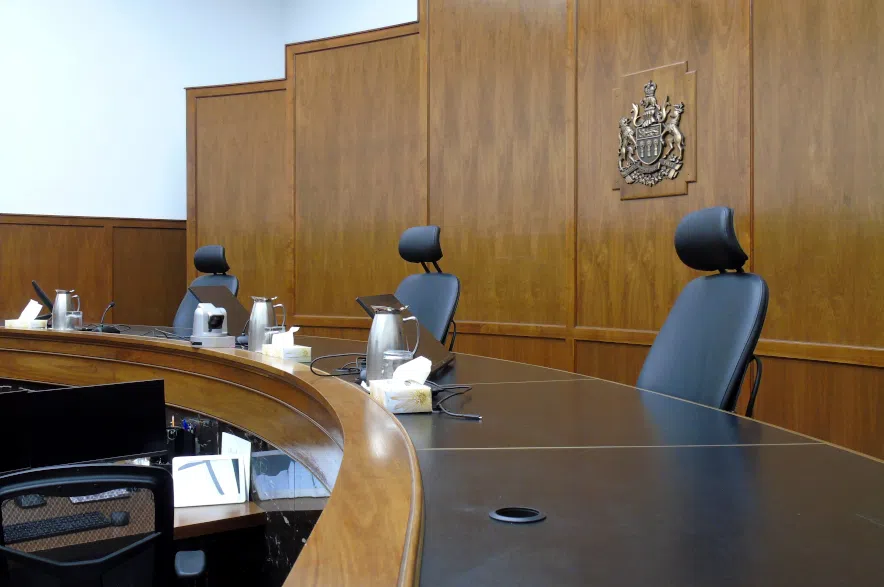A Saskatchewan appeals court decision dismissing a stay appeal ended with some sharp words toward the Crown.
The case against Mohammed Zabihullah had been going on since May 7, 2018, when the information was sworn for the assault and aggravated sexual assault charges he ended up facing.
There was a trial set for October 2019, but it was postponed several times and eventually set for April 2024.
Read more:
- ‘Justice denied’: Another Sask. sex assault case stayed due to delay
- Issues finding a lawyer leads to Saskatoon sex assault case being stayed
But Zabihullah’s lawyers asked for a review under the Jordan principle – the precedent setting the ceiling for reasonable delay in a court case at 18 months for a provincial court case, or 30 months if it had a preliminary inquiry, as in this case, or was in superior court.
A longer delay than that without good reason is deemed unreasonable under the Charter and the charges are stayed more often than not.
A Court of King’s Bench judge found the case delay was 40 months and six days, not including delays due to the pandemic, a death in the Crown counsel’s family, and the withdrawal of the guilty plea.
The Crown appealed the stay on two points. The first point the appeals court didn’t consider because it wouldn’t have brought the delay below the 30-month threshold anyway.
The second point was that the King’s Bench judge erred by not taking the complexity of the case into consideration, arguing the test is whether the Crown took reasonable steps to prevent delay of the case, not necessarily that it was successful in doing so.
The appeals court took issue with this case being deemed particularly complex, saying there was a preliminary inquiry, the trial would have only been two days long, there were only two witnesses to be called, there wasn’t an abundance of documents, and no indication any expert evidence would have been called by either side.
It wrote in the decision that even a typical murder case wouldn’t qualify as a complex case under Jordan – so the appeals court found no error in the stay decision.
The Crown also tried to make an argument that wasn’t in the documents submitted to the court, however, Zabihullah’s lawyer was against this.
In the written decision, the justices said the argument could “easily have been identified” by the Crown previously with a careful reading of the delay decision, but it was the appeal court that actually brought the issue to the Crown’s attention.
“Based on this, it is difficult to draw any conclusion except that the delay associated with the timing of the presentation of this proposed new issue is the product of a lack of diligence on the Crown’s part, both before and after it filed its factum,” read the decision.
The court pointed out that the delay decision was rendered in December 2023, and the transcripts of that hearing were filed in March 2024, but the Crown only filed its factum in March 2025 – it’s supposed to be filed within 60 days of receipt of the transcript.
Read more:
- Saskatoon sexual assault case stayed due to six-year delay
- Sask. man heading to trial on same sex assault charge for a third time
The decision said the documents were only filed after the registrar referred the matter to case management because of the lack of progress, and an appeal judge ordered the documents be filed.
“In a case that was about the reasonableness of delay, it is remarkable that the Crown has shown no alacrity in the prosecution of this appeal,” read the decision.
The court decided not to hear the third argument, saying it would have added further delay and prejudice to Zabihullah.
“The compounding effect of the Crown’s failure to prosecute this appeal in a diligent manner on top of the delay that has otherwise occurred rendered it unreasonable for this Court to exercise its discretion to allow the Crown to expand the scope of its appeal,” explained the justices in the written decision.
As such, the appeal of the stay was dismissed.
The Ministry of Justice didn’t comment specifically on this case or the comments from the justices, however in a statement it did say the time to perfect and argue an appeal can vary depending on the complexity of a case.
The statement also pointed out that a number of initiatives have recently been implemented, including establishing the Major Case Assistance Unit. It’s means to support the most serious and complex cases, and has Senior Crown Prosecutors asses and help with major cases, and provide mentorship to colleagues in other cases.
“While there are many factors that affect how a case moves through the justice system, this unit focuses on improving efforts to effectively assess major cases, prosecute those that go to trial, arrive at just resolutions, and reduce the time it takes to conclude matters,” explained the ministry.
Justice also pointed out that the median number of days it takes to complete and resolve cases in Saskatchewan is 155, according to Statistics Canada, that’s the second-lowest in the country, and 72 fewer than the national median.
It also said Saskatchewan has the lowest number of Jordan-related stays in the provinces, second to PEI, and aside from Newfoundland, Quebec, and Manitoba which didn’t have numbers reporting.











